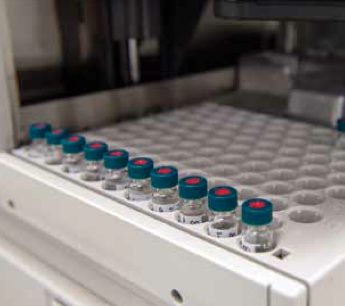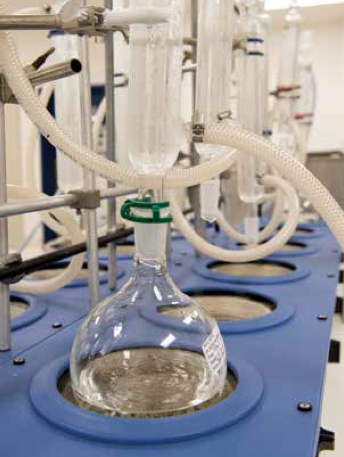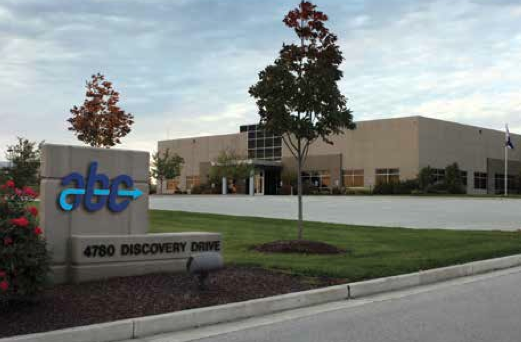Growth Mode
In July, local biotech company ABC Laboratories finalized its sale to Evans Analytical Group, a California-based laboratory network.
The merger makes ABC Labs a wholly owned subsidiary of EAG but leaves ABC’s day-to-day operations intact, with no anticipated changes to the company’s name, contracts, client relationships or regulatory filings, says ABC Labs Vice President of Marketing Kristein King.
EAG has an international network of laboratories, employs 1,200 employees and serves more than 5,500 customers worldwide.
The only immediate staffing change is that John Bucksath, formerly CEO of ABC, is now a senior vice president at ABC of EAG.
The deal, which was finalized for an undisclosed amount in early July, included a cash payout for the more than 400 equity investors in the company, many of whom are located in mid-Missouri. Bucksath said payments had begun as of July. More than 90 percent of the shareholders voted on the merger, with 100 percent in favor.
Late last year, ABC approached investment banking firm Lincoln International to start searching for potential buyers, with an eye toward better positioning the company for long-term growth. Private equity firm Odyssey Partners, which majority owns EAG, stepped up.
Bucksath confirms ABC does not anticipate any additional changes in staffing of the Columbia Discovery Ridge or ABC Lane facilities in the near future. “At this point in time, we don’t anticipate any change in operation sites,” he says. “We’re hoping to push forward in growth mode, and operation facilities are a critical part of the capacity.”
If anything, the growth-friendly environment in Columbia could encourage EAG to expand operations here at some point, Bucksath says.
“Our systems and infrastructure at ABC are ahead of the curve, so there is more interest in looking at how to take advantage of that,” he says.
ABC’s experience and award-winning work in the agriculture and pharmaceutical industries were key factors that piqued EAG’s interest, along with ABC’s performance and growth.
“They knew us quite well as a competitor on the ag side,” Bucksath says, “and the proof is in the culmination of three years of Contract Research Organization Leadership awards, as selected by the pharmaceutical industry.”
EAG CEO Siddhartha Kadia emphasized the importance of the expertise and experience represented in the ABC employee base.
“We especially value the scientific talent that is resident at the ABC laboratories and plan to continue to recruit, retain and develop talent to sustain our market leadership in this business for the combined company,” he says.
Long-term vision
ABC’s unique blend of expertise, experience and market knowledge — along with a strong client base — make it a natural fit for EAG’s long-term vision as a global leader in laboratory networks.
 “We were previously, in some aspects, competitors,” Bucksath says. “With industries consolidating and as outsourcing matures to help develop products, they were looking for an organization that could help them on a global scale.”
“We were previously, in some aspects, competitors,” Bucksath says. “With industries consolidating and as outsourcing matures to help develop products, they were looking for an organization that could help them on a global scale.”
Before, if someone had a new product, they would develop it here in the United States and then look at opportunities for expanding into markets in Europe, South America or other parts of the world. Today, Bucksath says, that’s done all at once.
Until now, ABC’s reach has been limited to the domestic market, though it does have global clients with products or services located in the U.S.
“EAG is a global company, so we are now opened up to the global community in offering our services,” Bucksath says. “It moves us up the food chain.”
King says ABC’s crop-protection customers are some of those “looking for a better full-service, global option than is currently available.”
With the acquisition, EAG essentially turned a competitor into a business partner while adding new capacities to the EAG lineup.
“ABC has built a very strong reputation with both agrochemical and pharmaceutical clients and is a strong complementary fit with our business,” Kadia says.
EAG’s existing laboratory network included materials, microelectronics and chemical testing divisions. Its ChemEco division, which largely provides analytical chemistry services for agricultural clients, is where ABC fits in. Agricultural testing in such areas as animal health and crop protection represents a large business segment for ABC, along with consumer products and chemical industries, and the company also has an even larger foothold in pharmaceutical testing and biotech — both new areas for EAG.
Currently, about 55 percent of ABC’s sales are in the pharmaceuticals division, with the other 45 percent in agriculture and chemical companies.
Continually evolving government regulations have contributed to the demand for scientific service companies with the ability to provide a wide range of testing and analysis, which is one reason Kadia cites as incentive for the merger.
Examples in the United States include broad Environmental Protection Agency regulations; Food and Drug Administration guidance on e-cigarettes; and FDA guidelines for pharmaceuticals, medical devices and cosmetics. In Europe, the Registration, Evaluation, Authorisation and Restriction of Chemicals regulations address the chemical industry’s impacts on human health and the environment.
One unique area of expertise ABC brings to the plate is high-level organic chemistry services, including radio labeling, Bucksath says. Radio labeling involves inserting a low-level radioactive tracer inside a material for better determining safety and efficacy during product development.
Existing client relationships at ABC will continue and transfer to the new combined company. One recent example is a partnership announced in March with Immunophotonics, a St. Louis-based biotech firm currently researching a potential cancer vaccine. Bucksath says that partnership and others like it represent years of service and relationship-building and will continue uninterrupted.
Merging corporate cultures
ABC Labs has a long history in Columbia, tracing back to its start in 1968. Founded by University of Missouri professor emeritus Dr. Charles Gehrke and two graduate students, Jim Ussary and David Stalling, the company’s original focus was on testing agricultural chemicals. Within a few years, ABC was manufacturing its own equipment for use in the lab and pioneered processes that allowed faster analysis of sample materials.
As it expanded, the company added pesticide residue analysis, aquatic testing, environmental studies, biopharmaceutical  analysis and human clinical studies to its original repertoire.
analysis and human clinical studies to its original repertoire.
In Columbia, ABC employs just over 430 employees both in and out of the lab. Although they won’t see any near-term changes to structure or staffing levels, Bucksath says they have already started the process of melding the ABC and EAG employee cultures and processes.
“EAG is larger, so we’ll evolve to a larger corporate-type environment,” he says. “That creates a lot of opportunities for folks who are interested.”
As two companies in the highly specialized scientific services industries, ABC and EAG already have similar corporate cultures, King says, and EAG has started including ABC leadership in strategic planning to ensure collaboration and integration.
The merged companies’ global reach also opens doors for interested employees to follow new career paths within a larger framework and explore opportunities for working at other sites across the U.S. and globally.
“When there is growth, there is opportunity for employees to advance their careers,” King says. “ABC has been and will continue to actively recruit and hire new employees to support this growth.”
She says employee reactions have been positive, as EAG has been reassuring that integration will be well thought-out and deliberate, with a focus on continuing to serve clients well.
ABC’s addition to the ChemEco group at EAG essentially doubles the division’s size, Bucksath says. ChemEco provides testing services in agrochemicals, pharmaceuticals and industrial chemicals markets.
There are other former ABC competitors also now among the ranks of companies acquired by EAG, creating a platform of similar services but with a diverse range of clients and industries being served.
There will be more opportunity now to share best practices, develop new processes and ideas and collaborate on new offerings, Bucksath says.
“Now there’s more critical mass to attack some of the things strategically that we couldn’t before,” he says. “Before EAG, our shareholder group was fantastic, but we did not have the bandwidth or global presence to move in that direction.”
Pace on the acquisition has been brisk, Bucksath says, and EAG leaders have already started bringing EAG and ABC teams together to meet, interact and collaborate. Some have already done client presentations together. “It’s gone better than I could ever hope for,” he says.
Location, location, location
For years, Columbia has been working to build a strong biotech base, centered largely on MU. ABC has long been a cornerstone of that local business segment and built a flagship facility at MU’s Discovery Ridge complex south of Columbia.
In 2006, ABC signed a 99-year lease for 11.5 acres at Discovery Ridge for a total $500,000 over five years. The company’s $15 million, 90,000-square-foot facility opened in 2008 and allowed for expansion of programs and staffing and modernization in the labs. ABC was the first tenant at Discovery Ridge and remains the anchor tenant today.
In April of this year, ABC announced a 7,000-square-foot expansion with additional lab and office space and high-tech enhancements to equipment. It also maintains a second large facility at the company’s original headquarters location on ABC Lane, located off Interstate 70 east of Highway 63.
EAG saw the benefits of ABC’s Columbia location, including its facilities and local demographics, favorable cost of living, good quality of life and central geography, Bucksath says, while recognizing the benefits of proximity to a large research university.



